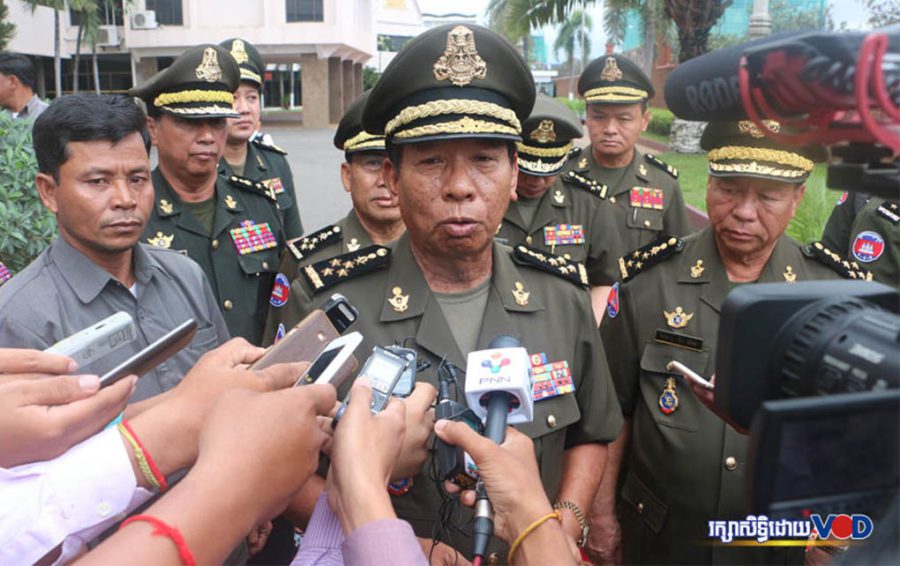Defense Minister Tea Banh has made an appeal for people to reject smear campaigns against Prime Minister Hun Sen’s government, saying they could help to foment “color revolution” and plunge Cambodia back into civil war.
Amid heightened international criticism over last year’s national election and opposition leader Sam Rainsy’s calls for Prime Minister Hun Sen’s overthrow, General Banh wrote on Facebook that political slurs were dividing the nation.
“Smearing is the main cause of hatred in our nation, making us enemies who retaliate against each other, which will lead to unexpected war,” Gen. Banh wrote on Wednesday, calling for leader to to stop casting aspersions on one another.
“I hope all Cambodians understand about smearing, and the consequences of smearing and join together to entirely prevent all activities of smearing.”
Banh told VOD on Thursday he believed escalating smear campaigns were the cause of Cambodia’s civil wars. Presently, he said, some were still smearing the government as Vietnamese or Chinese puppets and causing national rifts.
The Cambodian People’s Party (CPP) has its roots in the Vietnamese-backed invasion of 1979 that overthrew Pol Pot’s Khmer Rouge regime. Its first decade in power was buttressed by a Vietnamese military occupation and many in the opposition have according long characterized the party as subservient to Hanoi.
“The charges against the government — accusing the CPP or accusing some people of not respecting democracy — claims of dictatorship, all accusations,” Banh said of the smears that most hurt him. “They are what we consider to be the prime grounds for causing national breakup and it needs to be prevented.”
Asked whether he had ever witnessed the CPP itself smearing rivals, the defense minister claimed the CPP had tried not to make a habit of such behavior.
Mu Sochua, a vice president of the Cambodia National Rescue Party (CNRP) — who is living in exile and was last month ordered arrested — said the opposition always adhered to the principle of not seeing any Cambodians as enemies.
Those who endeavored to sideline her party, which she noted was supported by nearly half the country, were the ones causing national disunity, she said.
“We would like to ask for an end to the suggestion that [the CNRP] is a rebel group, and the order to demolish the rebel group,” Sochua said.
“This is more serious than smearing,” she said.
The CNRP was forcibly dissolved in November 2017 on accusations it and its leader, Kem Sokha, had engaged in treason by attempting to “topple” Hun Sen. As evidence, the government pointed to a speech by Sokha in which he said he had received advice from U.S. academics on how to foster democratic change.
This amounted to an admission of CNRP plans for a “color revolution,” it argued.
Sochua said that if the government ended its threats and repression of her party, its members would return to Cambodia to help solve issues in good faith.
“Smearing is one matter but orders to ‘eliminate’ — it is bigger than the smearing,” she said, apparently referring to Hun Sen’s repeated warnings over the past few years that he would readily “eliminate” the CNRP’s leadership.
Ly Srey Sros, a young independent political analyst, said she believed politicians on both sides habitually and reflexively accused each other of treason.
Despite his stated intention of fostering unity, Banh’s classification of his rivals as the only ones “smearing” others could itself be seen as an act of smearing.
“If Tea Banh and the government continue to see the opposition and civil society as the ones smearing the government, and do not see their own attitude as also a kind of smear, I think the people as well as the opposition and all those working with civil society groups become the victims of smearing,” Srey Sros said.
In February 2018, the government issued a special white paper that claimed the opposition and more than 300 groups were plotting government overthrow.
Since then, the U.S. and E.U. have argued that the book’s accusations and the government’s subsequent repression have constricted the space for democracy and have urged Hun Sen’s government to move to work with the opposition.
(Edited and translated from the original article on VOD Khmer)












